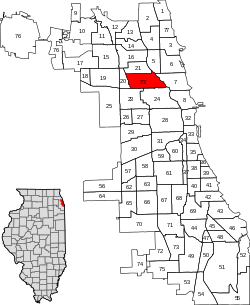Bucktown, Chicago
| Logan Square | |
|---|---|
| Community area | |
| Community Area 22 – Logan Square | |

Illinois Centennial Column – Logan Square
|
|
 Location within the city of Chicago |
|
| Coordinates: 41°55.7′N 87°42.4′W / 41.9283°N 87.7067°WCoordinates: 41°55.7′N 87°42.4′W / 41.9283°N 87.7067°W | |
| Country | United States |
| State | Illinois |
| County | Cook |
| City | Chicago |
| Neighborhoods | |
| Area | |
| • Total | 3.23 sq mi (8.37 km2) |
| Population (2010) | |
| • Total | 73,595 |
| • Density | 23,000/sq mi (8,800/km2) |
| Demographics 2014 | |
| • White | 43.32% |
| • Black | 5.31% |
| • Hispanic | 46.8% |
| • Asian | 2.56% |
| • Other | 2.01% |
| Time zone | CST (UTC−6) |
| • Summer (DST) | CDT (UTC−5) |
| ZIP Codes | parts of 60614, 60618, 60622, 60639, 60647 |
| Median household income | $49,610 |
| Source: U.S. Census, Record Information Services | |
Logan Square is an official community area, historical neighborhood, and public square located on the northwest side of the City of Chicago. The Logan Square community area is one of the 77 city-designated community areas established for planning purposes. The Logan Square neighborhood, located within the Logan Square community area, is centered on the public square that serves as its namesake, located at the three-way intersection of Milwaukee Avenue, Logan Boulevard and Kedzie Boulevard.
The community area of Logan Square is, in general, bounded by the Metra/Milwaukee District North Line railroad on the west, the North Branch of the Chicago River on the east, Diversey Parkway, on the north, and Bloomingdale Avenue on the south. The area is characterized by the prominent historical boulevards, stately greystones and large bungalow-style homes.
Logan Square is named for General John A. Logan, an American soldier and political leader. One of the most striking intersections in the city, the square itself is a large public green space (designed by architect William Le Baron Jenney, landscape architect Jens Jensen and others) formed as the grand northwest terminus of the Chicago Boulevard System and the junction of Kedzie and Logan Boulevards and Milwaukee Avenue, which was once known as "Northwest Plank Road" and traces its origins back to a Native American trail, prior to 1830. At the center of the square, known as Logan Square is the Illinois Centennial Monument, built in 1918 to commemorate the 100th anniversary of Illinois' statehood (geographic coordinates as shown above for this article). The monument, designed by Henry Bacon, famed architect of the Lincoln Memorial in Washington, DC and sculpted by Evelyn Longman, is a single 70-foot (25-meter) tall "Tennessee-pink" marble Doric column, based upon the same proportions as the columns of the Parthenon in Ancient Greece, and topped by an eagle, in reference to the state flag and symbol of the state and the nation. The monument was funded by the Benjamin Ferguson Fund.Reliefs surrounding the base depict allegorical figures of Native Americans, explorers, Jesuit missionaries, farmers and laborers intended to represent Illinois contributions to the nation through transportation as a railroad crossroads for passengers and freight (represented by a train extending across the arm of one of the figures), education, commerce, grain and commodities, religion and exploration along with the "pioneering spirit" during the state's first century.
...
Wikipedia
